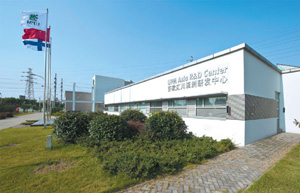Mixing old and new recipe for success
By Ren Kan and Yang Wanli (China Daily) Updated: 2014-08-19 11:19The proudest thing in Qi Taiyun's career is being a leading member of a Chinese drug company that has, since its founding in 1971, never had to borrow money for investment nor report a net loss.
Qi, secretary of Yunnan Baiyao Group Co Ltd, a company famous for its star product-Yunnan Baiyao, a traditional Chinese medicine for sprains and bruises from injuries-said the success of Yunnan Baiyao Group is based not only on its secret recipe but also its ability to change.
According to statistics, Yunnan Baiyao Group's market value soared dramatically from about 300 million yuan ($48.8 million) in 1993 to 70.8 billion yuan in 2013, when it saw a revenue of 15.8 billion yuan and had the highest sales among Chinese listed drug companies.
Such success does not come without toil. Yunnan Baiyao Group started as a State-owned company in the 1970s. As the economy opened up in China in the 1980s, the planned economy was losing its competitive edge.
In the State-owned company, production was planned by the government, Qi said. Without the driving forces of the market mechanism, the workers received the same salary and had no passion to make progress, not to mention creativity and innovation.
Change started to occur in the late 1980s before Yunnan Baiyao Group became a listed company on the stock market in 1993.
About 700 workers were made redundant, and 50 of them protested the decision by wielding axes in front of the manager's home.
"In that toughest period, we invited several kung fu masters to protect our manager day and night to prevent any malicious attacks," Qi said.
"The company was like a cancer patient. If it received surgery, it had a chance to live."
The introduction of competition in the workplace provided the solution to worker unrest.
Production quality and quantity, as well as cost, including money paid for water and electricity in every working unit, were all factored into workers' performance and used to determine salary levels and the year-end bonus.
The sales department also underwent changes and was chosen to lead the reform of Yunnan Baiyao Group. The company only had 15 sales managers in 1999. In order to expand the market, the performance of the sales managers was assessed, and the three with lowest figures in terms of annual sales faced being fired.
"The rules of the game could never be broken or changed for someone. Whether a person had worked for the company for decades or was a new employee, everyone was treated equally," Qi said.
- China, Australia perfect partners in dairy dining boom
- Lending slump not a concern for policymakers
- Rash diversification could undermine Alibaba
- S. Korean president meets with Alibaba's Ma
- Chinese market attractive for Lithuanian companies
- Taking the right steps for a transparent auto market
- Xi stresses innovation to drive economic transition
- Shanghai-HK stock link to accelerate China's reforms
















